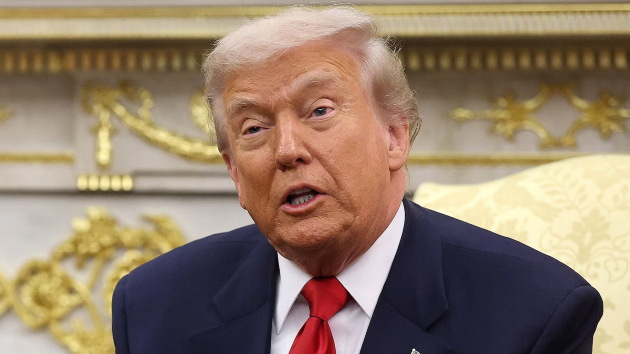Biden administration seeks billions more in Ukraine aid, teeing up congressional fight
Written by ABC Audio ALL RIGHTS RESERVED on August 10, 2023

(WASHINGTON) — The Biden administration has unveiled a $40 billion supplemental funding request to Congress, which includes aid for the war in Ukraine, border and migration, disaster response and firefighter pay — an ask that will be a hard sell to Republican lawmakers in the House.
For Ukraine and other international needs, the administration is asking for roughly $24 billion. That total includes $9.5 billion “for equipment for Ukraine and replenishment of DOD stocks; and $3.6 billion for continued military, intelligence, and other defense support.” The administration is also asking for $7.3 billion for economic, humanitarian, and security assistance to Ukraine and other impacted countries and populations.
Senior administration officials said this supplemental request is funding for the first quarter of 2024. They left the door open to future requests for aid to Ukraine if needed.
The administration is also seeking $4 billion for border and migration, $12 billion for the disaster relief fund and wildland firefighter pay.
Now that the administration has asked for supplemental funding, the ball is in Congress’ court. Time is running out for lawmakers to act before existing U.S. aid for Ukraine runs dry. Per senior administration officials, existing funds could run out by the end of September.
But can a divided Congress actually approve this spending request?
Ukraine funding is going to face a much steeper resistance in Congress than any previous funding package has. Whether opposition from hard-line House Republicans can be overcome remains to be seen, and a looming government shutdown means Congress could be locking horns over this issue as soon as next month.
Popularity of Ukraine funding is waning in some camps on the Hill
Ukraine funding has waned in popularity among some Republicans for months. There’s a number of reasons for that, ranging from concern about lack of oversight for the funding to worries about draining US resources in service of foreign countries.
In a House vote last month, 70 House Republicans voted in favor of an amendment that would have stripped all funding for Ukraine. That’s not enough to doom Thursday’s request yet, but it signals a shifting priority for House Republicans.
Ukraine funding is also less popular with Americans, with 55% of Americans opposing authorizing additional funding to support Ukraine, according to a CNN poll released last week.
Looming government shutdown brings Ukraine aid into focus
President Joe Biden’s request for additional Ukraine aide comes as Congress is gearing up for a September battle over government funding, which will run out on Oct. 1 if Congress doesn’t act. The possibility of a shutdown could make passage of additional Ukraine aid even more cumbersome.
As some lawmakers look to include funding for Ukraine in the discussion about government funding more generally, they’ll be somewhat hamstrung by a deal struck by House Speaker Kevin McCarthy and Biden earlier this year that set caps on defense and non-defense spending in exchange for Republican agreement to suspend the debt limit.
Some Senate Republicans decried the caps on defense spending in the debt limit deal in part due to concern that it would make it more difficult to continue aid to Ukraine, so Senate leaders offered up the possibility of a supplemental aid package, like the one the White House requested Thursday, to augment the defense cap in order to get their sign off.
Supplemental funding requests are not impacted by the cap.
Majority Leader Chuck Schumer, in response to the White House’s actions on Thursday, is already signaling that he’ll try to pass the supplemental funding request.
“There is strong bipartisan support in the Senate for doing more to help our fellow citizens impacted by natural disasters, fight the scourge of fentanyl, and support our partners in Ukraine,” Schumer said in a statement. “We hope to join with our Republican colleagues this fall to avert an unnecessary government shutdown and fund this critical emergency supplemental request.”
Schumer very well may succeed despite the opposition from some Republicans. While there’s a growing contingent of Senate Republicans who oppose Ukraine aid, there’s still pretty broad support for Ukraine in the upper chamber, including from GOP Leader Mitch McConnell.
At a press event on Wednesday, McConnell said he “looked forward” to viewing the administration’s request, and reaffirmed his support for Ukraine.
“Most of the money that we spend related to Ukraine is actually spent in the US, replenishing weapons, more modern weapons, and improving our own military, for what may lie ahead,” McConnell told reporters.
But passage is less likely in the House. Hard-line Republicans oppose supplemental funding because they feel it flies in the face of the hard-fought budget cuts they secured in the debt limit deal.
McCarthy told ABC News back in June that he supports Ukraine but is not interested in providing supplemental funding.
“I support our actions in Ukraine,” McCarthy said. “But just like any aid that anybody asks [for], if they ask me for more funding for something in a street, you gotta tell me how much money you need, what do you want to achieve, and would this solve the problem.”
“We just worked on an agreement,” McCarthy said, referring to the debt ceiling deal. “Working [on] a supplemental right now is only blowing up the agreement. That’s all about spending more money. So, no, I do not support a supplemental.”
There’s a number of ways that lawmakers could try to get a vote on the supplemental funds. The timing is not clear, but Congress could be grappling with this request as soon as next month.
As the threat of a shutdown grows nearer and nearer, it’s possible Congress would need to consider a stop gap measure to keep the government funded, at least until they can reach broader agreement on government funding bills. If that happens, the Senate could join the supplemental funding to that package, clearing the way for easier passage in the Senate. What’s less clear is whether the House would take up such a bill.
ABC News’ Lauren Peller and Luis Martinez contributed to this report.
Copyright © 2023, ABC Audio. All rights reserved.
 KVSP
KVSP 



